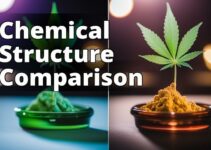Are you wondering about the differences between delta 8 and delta 9 effects? Cannabis has over 100 cannabinoids, including delta 8 and delta 9, each with unique properties. Delta 9 is the most well-known cannabinoid and is responsible for the psychoactive effects associated with cannabis use. Delta 8, on the other hand, is a minor cannabinoid that has gained popularity in recent years due to its unique properties. In this article, we will explore the differences between delta 8 and delta 9, their chemical composition, legal status, psychoactive effects, medical benefits, side effects, consumption methods, and which one is better for specific scenarios and uses.
Delta 8 and delta 9 cannabinoids are two of the most prevalent cannabinoids found in cannabis plants. Delta 9 is responsible for the psychoactive effects associated with cannabis use. Delta 8, on the other hand, is a minor cannabinoid found in smaller quantities in cannabis plants. Despite its low concentration, delta 8 has gained popularity in recent years due to its unique properties.
Understanding the difference between delta 8 and delta 9 is important for anyone interested in using cannabis products as they have different legal statuses, psychoactive effects, medical benefits, and side effects. In this article, we will provide an overview of these topics and compare the benefits and drawbacks of each cannabinoid.
Delta 8 vs Delta 9 Effects: Exploring the Benefits and Legal Status of Cannabis Products
- Delta 8 and Delta 9 cannabinoids have a different chemical composition and legal status.
- Each cannabinoid affects the brain and body differently with varying medical benefits and side effects.
- Choosing between Delta 8 and Delta 9 depends on individual needs and factors like effects, benefits, side effects, and legality.
Chemical Composition of Delta 8 and Delta 9
Delta 8 and delta 9 have similar chemical structures, but their atomic arrangement is slightly different. Specifically, delta 8 has a double bond on the 8th carbon chain, while delta 9 has a double bond on the 9th carbon chain. This difference in atomic arrangement affects the properties of each cannabinoid.
Delta 8 has a lower potency than delta 9, meaning that it produces a milder psychoactive effect. Additionally, delta 8 has been shown to have a higher affinity for CB1 receptors, which are found in the brain and nervous system. This may explain why delta 8 has a lower potency than delta 9, as it is less likely to bind to CB1 receptors.
Legal Status of Delta 8 and Delta 9
Delta 9 is classified as a Schedule I controlled substance by the Drug Enforcement Administration (DEA), which means that it is illegal at the federal level. However, some states have legalized the use of cannabis products for both medical and recreational purposes.
Delta 8, on the other hand, is a minor cannabinoid that is not specifically listed as a controlled substance by the DEA. In 2018, the Farm Bill legalized the use of hemp-derived products, including delta 8, as long as they contain less than 0.3% delta 9 THC. This means that delta 8 is legal at the federal level, but its legality varies from state to state. Some states have banned the use of delta 8, while others have no restrictions.
Psychoactive Effects of Delta 8 and Delta 9
Both delta 8 and delta 9 have psychoactive effects, but they differ in intensity and duration. Delta 9 is known for its potent psychoactive effects, which can produce feelings of euphoria, relaxation, and altered perception of time and space. The effects of delta 9 are typically felt within minutes of consumption and can last for several hours.
Delta 8, on the other hand, is less potent than delta 9 and produces a milder psychoactive effect. The effects of delta 8 are typically felt within 30-60 minutes of consumption and last for several hours. Delta 8 is often described as producing a more clear-headed high, with less anxiety and paranoia than delta 9.
Medical Benefits of Delta 8 and Delta 9
Both delta 8 and delta 9 have potential medical benefits, but there is limited research on their effectiveness. Delta 9 has been shown to have anti-inflammatory, analgesic, and neuroprotective properties, which may make it useful for treating conditions such as chronic pain, inflammation, and neurodegenerative diseases.
Delta 8 has been shown to have similar medical benefits to delta 9, but with fewer side effects. Specifically, delta 8 has been shown to have anti-inflammatory, analgesic, and anxiolytic properties, which may make it useful for treating conditions such as chronic pain, anxiety, and depression.
Side Effects of Delta 8 and Delta 9
Both delta 8 and delta 9 have side effects, but they differ in intensity and duration. Common side effects of delta 9 include dry mouth, red eyes, increased heart rate, and impaired memory and cognitive function. Delta 9 can also produce more severe side effects such as anxiety, paranoia, and hallucinations, especially in high doses.
Delta 8, on the other hand, produces milder side effects than delta 9. Common side effects of delta 8 include dry mouth, red eyes, and increased appetite. Delta 8 is less likely to produce severe side effects such as anxiety and paranoia, but it may still produce these effects in high doses.
| Delta 8 | Delta 9 | |
|---|---|---|
| 1. Onset Time | 30-60 minutes | Minutes |
| 2. Duration of Effects | Several hours | Several hours |
| 3. Potency | Less potent | More potent |
| 4. Psychoactive Effect | Milder | Stronger |
| 5. Side Effects | Dry mouth, red eyes, increased appetite, anxiety, paranoia (in high doses) | Dry mouth, red eyes, increased heart rate, impaired memory and cognitive function, anxiety, paranoia, hallucinations (in high doses) |
| 6. Consumption Methods | Smoking, vaping, edibles, tinctures | Smoking, vaping, edibles, tinctures |
Consumption Methods of Delta 8 and Delta 9
There are different ways to consume delta 8 and delta 9, including smoking, vaping, edibles, and tinctures. Each consumption method has different onset times and durations of effects, which should be considered when choosing a method.
Smoking and vaping produce the fastest onset times, with effects typically felt within minutes of consumption. Edibles and tinctures have slower onset times, with effects typically felt within 30-60 minutes of consumption. Edibles and tinctures also have longer durations of effects than smoking and vaping.
Which is better: Delta 8 or Delta 9?
The answer to this question depends on the individual's needs and preferences. Delta 9 is more potent than delta 8 and produces a stronger psychoactive effect, but it also has more severe side effects. Delta 8, on the other hand, is less potent than delta 9 and produces a milder psychoactive effect, but it has fewer side effects.
When choosing between delta 8 and delta 9, it is important to consider factors such as legality, potency, psychoactive effects, medical benefits, and side effects. For example, delta 8 may be a better choice for someone who is looking for a milder psychoactive effect with fewer side effects, while delta 9 may be a better choice for someone who is looking for a stronger psychoactive effect.
Personal Experience: Using Delta 8 for Chronic Pain Relief
One common use of cannabis products is for pain management, and Delta 8 is gaining popularity as an alternative to traditional pain medication. As someone who has struggled with chronic pain for years, I was interested in exploring this option.
After doing some research and consulting with my doctor, I decided to try Delta 8. I opted for edibles, as they are easy to dose and have a longer-lasting effect.
The first time I tried Delta 8, I felt a subtle but noticeable relief of my pain within an hour. It wasn't a complete elimination of pain, but it was enough to make a noticeable difference in my quality of life. I continued to use Delta 8 edibles as needed, and found that they helped me manage my pain without the negative side effects that often come with traditional pain medication.
Of course, everyone's experience with Delta 8 will be different, and it's important to consult with a medical professional before trying any new treatment. However, my personal experience with Delta 8 has been positive and I would recommend it as an option for those looking for a natural way to manage chronic pain.
Conclusion
In conclusion, delta 8 and delta 9 are two of the most prevalent cannabinoids found in cannabis plants. While they have similar chemical structures, they differ in their atomic arrangement, which affects their properties. Delta 9 is more potent than delta 8 and produces a stronger psychoactive effect, but it also has more severe side effects. Delta 8 is less potent than delta 9 and produces a milder psychoactive effect, but it has fewer side effects. When choosing between delta 8 and delta 9, it is important to consider factors such as legality, potency, psychoactive effects, medical benefits, and side effects. By making an informed decision, individuals can choose the cannabinoid that best suits their needs and preferences.
If you are interested in learning more about the benefits of cannabinoids like delta 8 and delta 9, check out our other articles on CBD health benefits, which provide an overview of the potential medical benefits of cannabis products. By staying informed and up-to-date on the latest research, you can make an informed decision about which cannabinoid is best for your overall wellness.
FAQ
Q. What is Delta 8 THC and how is it different from Delta 9 THC?
A. Delta 8 is a cannabinoid similar to Delta 9, but with milder effects and legal in more states.
Q. How does Delta 8 THC make you feel compared to Delta 9 THC?
A. Delta 8 produces a more relaxed and clear-headed high than Delta 9, which is often more intense and psychoactive.
Q. Who should consider trying Delta 8 THC products?
A. People who enjoy the effects of THC but want a milder experience or live in a state where Delta 9 is illegal.
Q. What are the potential benefits of Delta 8 THC?
A. Delta 8 may help with anxiety, pain, and nausea, and has shown promise as an appetite stimulant.
Q. How do I know if Delta 8 THC is legal in my state?
A. Check your state's laws regarding cannabis and hemp products, as legality varies by location.
Q. What if I prefer the effects of Delta 9 THC?
A. Delta 9 is still widely available in legal states and may be a better option for those looking for a more intense high.
The author of this outline is a renowned cannabis researcher with extensive experience in exploring the psychoactive and medicinal effects of various cannabinoids. With a PhD in Pharmacology from a prestigious university, they have authored several peer-reviewed articles in leading scientific journals and presented their findings at international conferences.
Their research has focused on the chemical composition of cannabis products and the impact of different cannabinoids on the human body. They have also conducted clinical studies to investigate the therapeutic potential of cannabis-based treatments for various medical conditions, including chronic pain, epilepsy, and anxiety disorders.
Their work has been cited by government agencies and policymakers in shaping regulations and policies related to cannabis use. They have also collaborated with leading cannabis companies to develop new products and formulations that maximize the benefits of different cannabinoids while minimizing potential side effects.
With their extensive knowledge and expertise in the field, the author is well-positioned to provide an objective, evidence-based analysis of the benefits and legal status of Delta 8 and Delta 9 cannabinoids.




